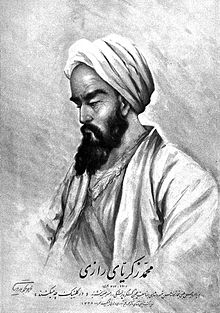
Back Rasis Afrikaans أبو بكر الرازي Arabic ابو بكر الرازى ARZ Al-Razi AST Məhəmməd ibn Zəkəriyə əl-Razi Azerbaijani Әбү Бәкер Әр-Рази Bashkir Абу Бакр Мухаммад ибн Зекария ал-Рази Bulgarian আল রাযী Bengali/Bangla Ar-Razí Catalan Абу Бакр Мухьаммад ар-Рази CE
Abū Bakr al-Rāzī | |
|---|---|
 Portrait of Rhazes | |
| Born | 864 or 865 CE 250 or 251 AH Ray (Iran) |
| Died | 925 (aged 60–61) CE or 935 (aged 70–71) CE 313 or 323 AH Ray (Iran) |
| Era | Islamic Golden Age |
| Language | Arabic (writings) |
Main interests | Medicine, philosophy, alchemy, criticism of religion |
Notable ideas | The first to write up limited or extensive notes on diseases such as smallpox and chickenpox, a pioneer in ophthalmology, author of the first book on pediatrics, making leading contributions in inorganic and organic chemistry, also the author of several philosophical works. |
Abū Bakr al-Rāzī (full name: أبو بکر محمد بن زکریاء الرازي, Abū Bakr Muḥammad ibn Zakariyyāʾ al-Rāzī),[a] c. 864 or 865–925 or 935 CE,[b] often known as (al-)Razi or by his Latin name Rhazes, also rendered Rhasis, was a Persian physician, philosopher and alchemist who lived during the Islamic Golden Age. He is widely regarded as one of the most important figures in the history of medicine,[1] and also wrote on logic, astronomy and grammar.[2] He is also known for his criticism of religion, especially with regard to the concepts of prophethood and revelation. However, the religio-philosophical aspects of his thought, which also included a belief in five "eternal principles", are fragmentary and only reported by authors who were often hostile to him.[3]
A comprehensive thinker, al-Razi made fundamental and enduring contributions to various fields, which he recorded in over 200 manuscripts, and is particularly remembered for numerous advances in medicine through his observations and discoveries.[4] An early proponent of experimental medicine, he became a successful doctor, and served as chief physician of Baghdad and Ray hospitals.[5][6] As a teacher of medicine, he attracted students of all backgrounds and interests and was said to be compassionate and devoted to the service of his patients, whether rich or poor.[7] He was the first to clinically distinguish between smallpox and measles, and suggest sound treatment for the former.[8]
Through translation, his medical works and ideas became known among medieval European practitioners and profoundly influenced medical education in the Latin West.[5] Some volumes of his work Al-Mansuri, namely "On Surgery" and "A General Book on Therapy", became part of the medical curriculum in Western universities.[5] Edward Granville Browne considers him as "probably the greatest and most original of all the Muslim physicians, and one of the most prolific as an author".[9] Additionally, he has been described as the father of pediatrics,[10][11] and a pioneer of obstetrics and ophthalmology.[12]
Cite error: There are <ref group=lower-alpha> tags or {{efn}} templates on this page, but the references will not show without a {{reflist|group=lower-alpha}} template or {{notelist}} template (see the help page).
- ^ Walker 1998; Iskandar 2008; Adamson 2021a.
- ^ Majid Fakhry, A History of Islamic Philosophy: Third Edition, Columbia University Press (2004), p. 98.
- ^ Adamson 2021a
- ^ Hakeem Abdul Hameed, Exchanges between India and Central Asia in the field of Medicine Archived 6 October 2008 at the Wayback Machine
- ^ a b c Iskandar 2008.
- ^ Influence of Islam on World Civilization" by Prof. Z. Ahmed, p. 127.
- ^ Rāzī, Abū Bakr Muḥammad ibn Zakarīyā, Fuat Sezgin, Māzin ʻAmāwī, Carl Ehrig-Eggert, and E. Neubauer. Muḥammad ibn Zakarīyāʼ ar-Rāzī (d. 313/925): texts and studies. Frankfurt am Main: Institute for the History of Arabic-Islamic Science at the Johann Wolfgang Goethe University, 1999.
- ^ ANSARI, A. S. BAZMEE (1976). "Abu Bakr Muhammad Ibn Yahya Al-Razi: Universal Scholar and Scientist". Islamic Studies. 15 (3): 155–166. ISSN 0578-8072. JSTOR 20847003.
- ^ Browne 1921, p. 44.
- ^ Tschanz David W., PhD (2003). "Arab(?) Roots of European Medicine". Heart Views. 4 (2).
- ^ Elgood, Cyril (2010). A Medical History of Persia and The Eastern Caliphate (1st ed.). London: Cambridge. pp. 202–203. ISBN 978-1-108-01588-2.
By writing a monograph on 'Diseases in Children' he may also be looked upon as the father of paediatrics.
- ^ "Ar-Razi (Rhazes), 864–930 C.E." www.unhas.ac.id. Archived from the original on 20 February 2020. Retrieved 27 February 2020.
Ar-Razi was a pioneer in many areas of medicine and treatment and the health sciences in general. In particular, he was a pioneer in the fields of pediatrics, obstetrics and ophthalmology.
© MMXXIII Rich X Search. We shall prevail. All rights reserved. Rich X Search